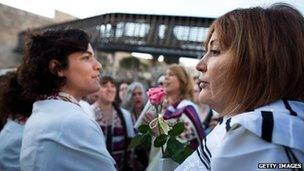Arrests as women pray at Jerusalem's Western Wall
- Published
Israeli police officers arrested three ultra-Orthodox protestors
Three men have been arrested after police held back hundreds of ultra-Orthodox protesters trying to prevent a liberal Jewish women's group from praying at Jerusalem's Western Wall.
It follows a recent court ruling that backed the women's right to pray using rituals ultra-Orthodox Jews believe should be for men only.
Last month, police detained members of the women's group for allegedly breaching a ban at the wall.
The arrests were overturned in court.
Police on Friday formed a cordon to keep back the protesters.
The large group of demonstrators was at the wall when the women turned up to pray in the hours before Shabbat, the Jewish Sabbath. They threw rubbish, water and chairs at the women, and stoned their buses.
Three ultra-Orthodox men were arrested for disorderly conduct, police said.
Court rulings
The Western Wall - a relic of the Biblical Temple compound - currently has separate sections where men and women are allowed to pray.

The women say they should not be prevented from praying using the same rituals as men
For several months, the Women of the Wall group has held prayers in the female side, wearing traditional shawls and reading aloud from the Torah.
This has sparked outrage and protests from Orthodox groups, who say women should not perform the rituals.
In early April, five women were arrested and charged with disturbing the peace. A lower court dismissed the charges and the women were freed, but the police appealed against this.
On 25 April, Jerusalem's district court upheld the ruling that Israeli security forces were wrong to arrest women. Judge Moshe Sobel also ruled that there was no "reasonable suspicion" that the women had broken any laws relating to holy sites.
It was this ruling that the police said they were upholding with their response to the protesters on Friday.
Correspondents say the dispute over the wall has become a symbol of the greater tensions in Israeli society between ultra-Orthodox Jews, who abide by a very strict interpretation of Jewish law, and more modern elements of Judaism.
- Published25 April 2013